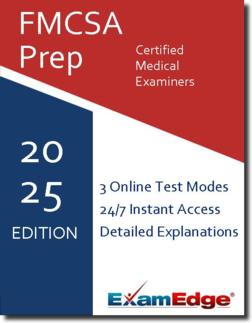FMCSA Certified Medical Examiner Practice Tests & Test Prep - Test Reviews
Based on 40 Reviews
- Real Exam Simulation: Timed questions and matching content build comfort for your FMCSA Certified Medical Examiners test day.
- Instant, 24/7 Access: Web-based FMCSA Certified Medical Examiners practice exams with no software needed.
- Clear Explanations: Step-by-step answers and explanations for your FMCSA exam to strengthen understanding.
- Boosted Confidence: Reduces anxiety and improves test-taking skills to ace your FMCSA Certified Medical Examiners (CME).

FMCSA Certified Medical Examiner Practice Tests & Test Prep - Review
FMCSA Certified Medical Examiners - Reviews
Excellent
Based on
200
reviews
“ Good exam review
Edna , Stamford, Connecticut
See why our users from 154 countries love us for their exam prep! Including 40 reviews for the FMCSA Certified Medical Examiners exam.
Exam Edge is an Industry Leader in Online Test Prep. We work with our Institutional Partners to offer a wide array of practice tests that will help you prepare for your big exam. No Matter how niche field of interest might be, were here to help you prepare for your test day.
| 2.8M | 4.5M | |
| Users | Tests Taken | |
| 100K | 19 | |
| Unique Exams | Years in Business | |


